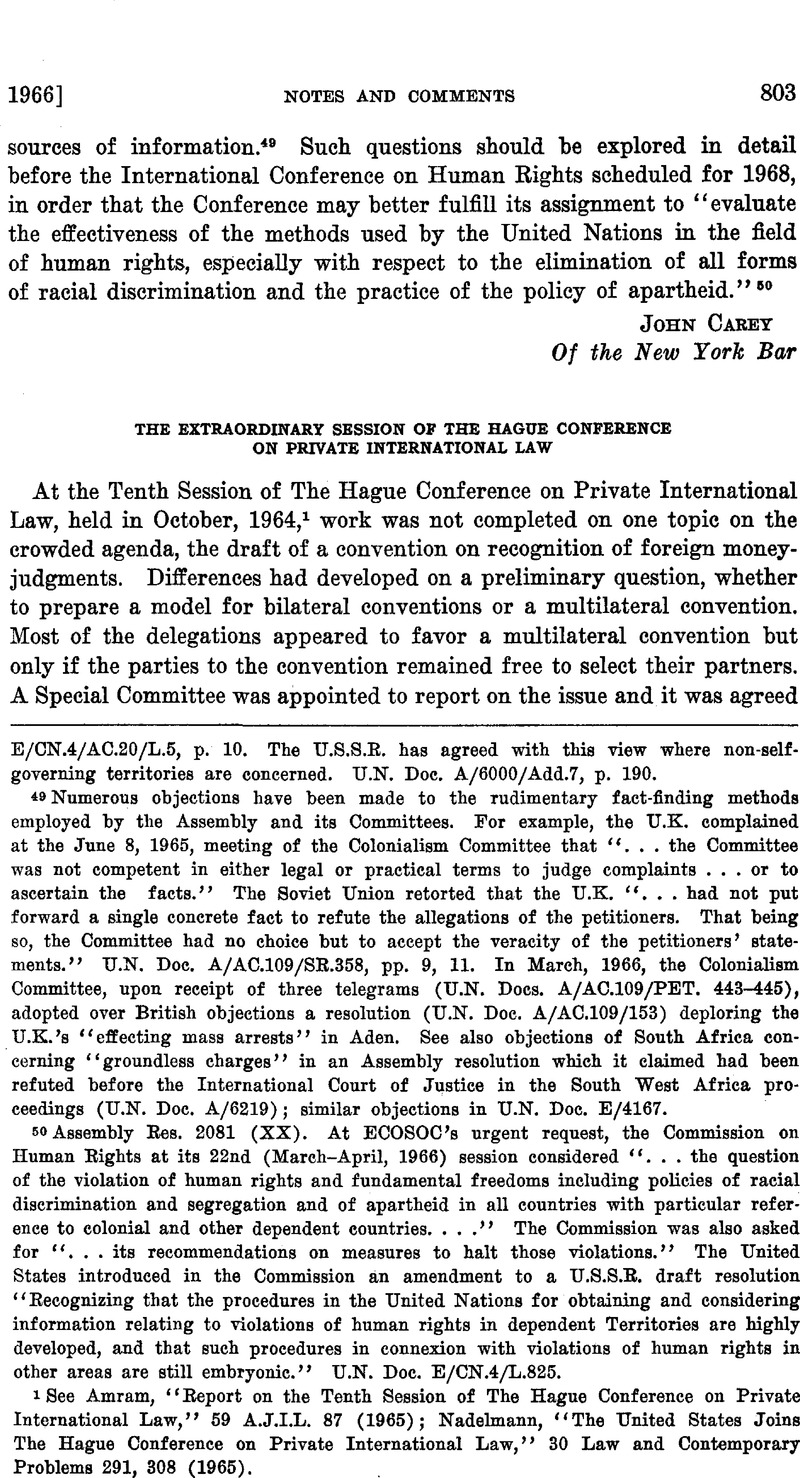Published online by Cambridge University Press: 28 March 2017

1 See Amram, , “Report on the Tenth Session of The Hague Conference on Private International Law,” 59 A.J.I.L. 87 (1965)Google Scholar; Nadelmann, , “The United States Joins The Hague Conference on Private International Law,” 30 Law and Contemporary Problems 291, 308 (1965).Google Scholar
2 The Delegation was composed of Richard D. Kearney, Deputy Legal Adviser, Department of State; Joe C. Barrett, Past President, National Conference of Commissioners on Uniform State Laws, of Jonesboro, Arkansas; and Kurt H. Nadelmann and Arthur T. von Mehren, of Cambridge, Massachusetts.
3 Text in 5 Int. Legal Materials 636 (1966).
4 See Nadelmann, ‘ ‘ Jurisdictionally Improper Fora,'’ in XXth Century Comparative and Conflicts Law—Legal Essays in Honor of Hessel E. Yntema 321 (Nadelmann, von Mehren, and Hazard, eds., 1961).
5 One of the difficulties arising with the Convention of 1964 relating to a Uniform Law on the International Sale of Goods comes from the use of jurisdictionally improper fora. See Nadelmann, , “The Uniform Law on the International Sale of Goods: A Conflict of Laws Imbroglio,” 74 Yale Law J. 449 (1965).Google Scholar
6 See Nadelmann, , ‘ ‘ Common Market Assimilation of Laws and the Outer World,'’ 58 A.J.I.L. 724 (1964)Google Scholar. According to a reading given the Common Market draft of a Convention on Eecognition of Judgments, judgments rendered in the Common Market states at jurisdictionally improper fora against non-residents of the Common Market will be enforceable in all Common Market states. See Arnold, “Der Entwurf eines Gerichtsstands- und Vollstreckungsabkommens fur die Europäische Wirtschaftsgemeinschaft,” 15 Aussenwirtschaftsdienst des Betriebs-Beraters 321, 323 (1965); Bellet, “ L ‘élaboration d'une convention sur la reconnaissance des jugements dans le cadre du Marché Commun,” 92 Journal du Droit International 833, 853 (1965); Bülow, “Vereinheitlichtes Internationales Zivilprozessrecht in der Europäischen Wirtschaftsgemeinschaft,” 29 Rabels Zeitschrift 473, 482 (1965). The point is not covered in Weser, “Some Reflections on the Draft Treaty on Execution of Judgments in the E.E.C.,” 1965 University of Illinois Law Forum 771.
7 U.S. Constitution, Art. IV, § 1. Cf. Pennoyer v. Neff, 95 U. S. 714, 729 (1878).
8 Generally speaking, against non-residents protection of local interests can be secured fully by exercise of quasi-in-rem jurisdiction, that is jurisdiction limited to the value of the assets within the jurisdiction. See the materials collected in von Mehren and Trautman, The Law of Multistats Problems 675 et seq. (1965). For criticism of an unnecessary use of this jurisdiction, see von Mehren and Trautman, “Jurisdiction to Adjudicate: A Suggested Analysis,” 79 Harvard Law Rev. 1121, 1141, 1177-1178 (1966).
9 See Nadelmann, , ‘ ‘ Non-Recognition of American Money-Judgments Abroad and What to Do About It,“ 42 Iowa Law Rev. 236 (1957)Google Scholar. For a recent development see Nadelmann, , ‘ ‘ French Courts Recognize Foreign Money Judgments,” 13 A. J. Comp. Law 72 (1964).Google Scholar
10 Representative is the Uniform Foreign Money-Judgments Recognition Act, prepared in 1962, Documents, 11 A. J. Comp. Law 412 (1962); 9(B) Uniform Laws Ann., [1965] Pocket Part 28. Presently enacted in Illinois, Maryland, and Oklahoma.
11 The numerous bilateral treaties concluded recently by European nations, including the United Kingdom, were taken into account in the drafting work.